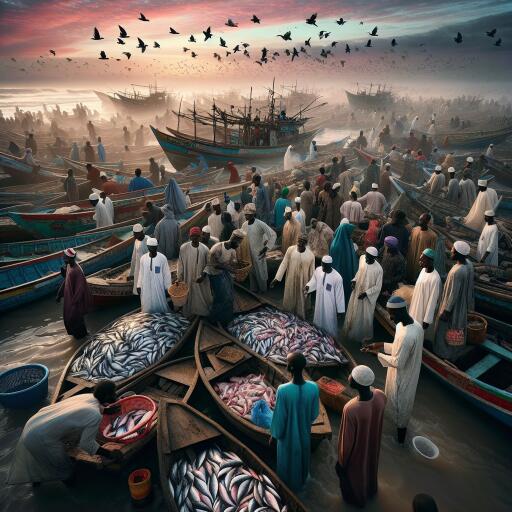
Eid al-Adha Amid Hardship: Senegal’s Fishermen Struggle to Celebrate Tabaski | Business
For many Muslims in Senegal, the festive spirit of Eid al-Adha, known locally as Tabaski, is overshadowed by a growing sense of unease. With inflation on the rise, employment opportunities scarce, and the gulf between the wealthy and the poor widening, celebrating this significant religious holiday has become increasingly challenging.
Among the hardest hit are Senegal’s fishermen, individuals who have historically depended on the sea’s bounty for their livelihoods. Their struggles encapsulate the broader economic tensions within the country. Ibrahima Diouf, a Senegalese fisherman, represents this group’s predicament. “Tabaski is all I can think about,” he shared, revealing the distress that comes with not being able to afford the traditional celebrations of Eid al-Adha.
Fishing communities, once thriving on the lucrative returns from the sea, are now facing unprecedented hurdles. The competition from global trawlers, which deplete local fish stocks through overfishing, combined with the adverse impacts of climate change, has put their way of life under threat. These external pressures are not only ecological but deeply economic, eating away at the already diminishing returns on their labor.
The hope for reform looms on the horizon, with the government making commitments to address these issues. However, for Diouf and many others in his community, promises of change offer little immediate relief. The reality remains stark, as they navigate the daily challenges posed by environmental degradation and economic instability.
The festival of Eid al-Adha, traditionally a time for joy, feasting, and charity, is becoming increasingly difficult to observe in the manner many Senegalese families would wish. The economic strain faced by fishermen like Diouf is symptomatic of the larger issues at play in Senegal, where societal and environmental changes are deeply intertwined. As the country grapples with these complex challenges, the hope is that solutions can be found that will allow all its citizens to participate fully in its cultural and religious festivities, free from the shadow of hardship.
As Eid al-Adha approaches, the struggle facing Senegal’s fishermen highlights a critical intersection of environmental issues and economic disparities. Their fight to maintain tradition amidst adversity is a poignant reminder of the broader implications of climate change and globalization on local communities. The people of Senegal, renowned for their resilience and community spirit, are calling for actionable change that can restore the balance between conserving their environment and sustaining their economy. For now, those like Diouf face the holiday season with uncertainty, but not without hope that future Tabaskis may return to being the joyous occasions they once were.





Leave a Reply